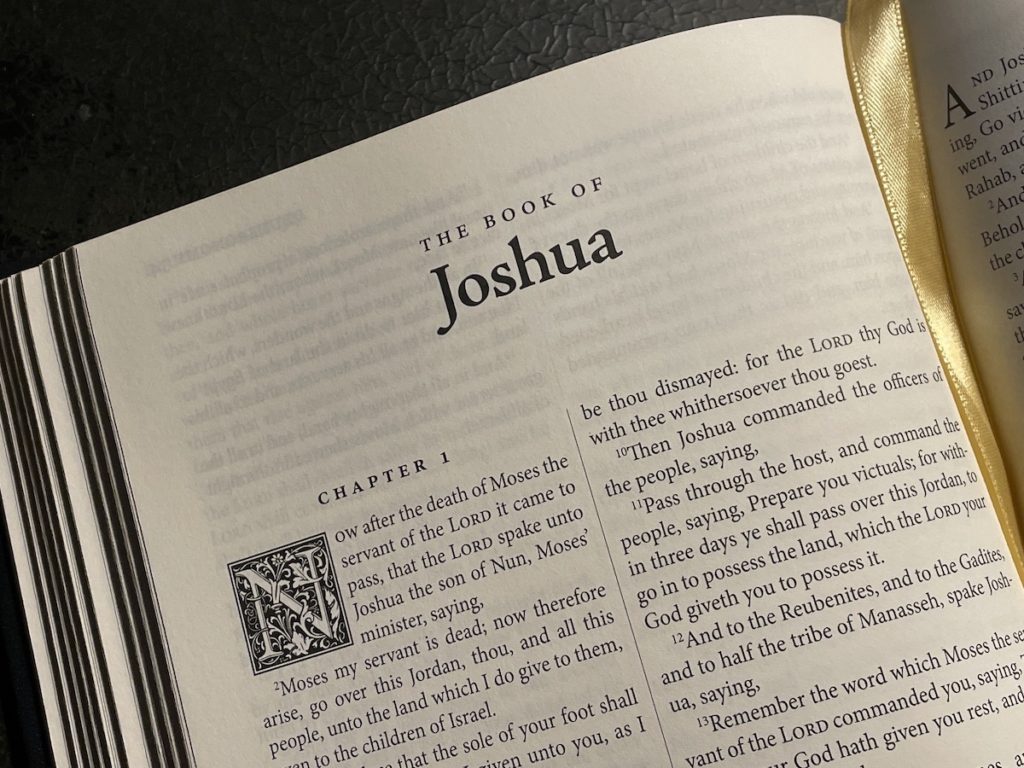
Joshua 22

Joshua 22:24, For fear. The eastern tribes of Israel constructed the altars along the banks of the Jordan River out of a fear of Elohim, and not because of idolatry. If everything that we do is based on our reverential as well as our dread fear for Elohim (these are the two aspects of the true biblical fear of Elohim), then we will be less likely to commit sin, that is, to stray from his commanded ways. This is because, as the Scripture elsewhere teaches us, the fear of Elohim is basis or beginning of both wisdom and knowledge. Knowledge is the revelation of YHVH’s divinely revealed Truth, and wisdom is the proper and use and application of that knowledge in our daily life.
Joshua 23
Joshua 23:7, Make mention. Here Joshua forbids the mention of the names of pagan deities by the Israelites, yet, ironically, the translators of the Bible, in the same verse, mention two names that were applied to pagan deities long before being used in reference to the Elohim of the Bible. They are: Lord and God.
Joshua 23:10, One man of you shall chase a thousand. See notes at Lev 26:8.
Joshua 23:12, Make marriages with them. In the Torah, and elsewhere in Scripture, we find many such warnings against the saints intermarrying with unbelievers. For example, Paul warns the saints in Corinth (and us), “Do not be unequally yoked together with unbelievers. For what fellowship has righteousness with lawlessness? And what communion has light with darkness? And what accord has Messiah with Belial? Or what part has a believer with an unbeliever? And what agreement has the temple of Elohim with idols? For you are the temple of the living Elohim. As Elohim has said: ‘I WILL DWELL IN THEM AND WALK AMONG THEM. I WILL BE THEIR Elohim, AND THEY SHALL BE MY PEOPLE.’ Therefore ‘COME OUT FROM AMONG THEM AND BE SEPARATE, SAYS THE LORD. DO NOT TOUCH WHAT IS UNCLEAN, AND I WILL RECEIVE YOU,”’ (2 Cor 6:15–17). In this present generation of general lukewarmness and a Laodicean attitude among most Christians, where a watered down gospel is being preached, coziness with the world is now acceptable. The problem is that in a marriage situation, being unequally yoked with an unbeliever, or even being married to someone who is not as zealous as you are can result in untold friction and conflict in a marriage—something that a wise person will avoid at all cost. The continual bad influences of an ungodly spouse may even corrupt the righteous spouse and cause them eventually to fall away spiritually. As Paul warned elsewhere, “Do not be deceived: “Evil company corrupts good habits,” (1 Cor 15:33).
Joshua 24
Joshua 24:15, As for me and my house. This is one of the most popular verses in the Bible, and many people have posted this passage from Joshua on placards near the doors to their houses. But what does it mean to serve YHVH Elohim? Many people claim Yeshua (Jesus) as their Savior, but when it comes to him being their Master (or Lord), well, that is another thing. To a large degree, many if not most Christians are still the lord of their own lives serving themselves. If the Bible (the Word of Elohim of whom Yeshua became the Living Word) commands them to do this or that, they filter it through their own thinking (as Adam and Eve did when tempted to disobey Elohim and eat of the forbidden fruit, thus committing the first sin), and they decide whether they want to obey or not. In many cases, they refuse to obey the Word of Elohim because they decide, for one reason or another, that it does not suit them. In this case, Yeshua is not the Master of their life and they are, in reality, not serving him but are serving their own carnal natures.
Joshua 24:19, You cannot serve YHVH. The carnal, non-Spirit filled, individual (e.g. the children of Israel) cannot serve or obey Elohim in their own strength and power. The children of Israel demonstrably proved this point while wandering in the wilderness for forty years. But since Yeshua sent his Set-Apart (or Holy) Spirit to live inside of this disciples (that is you and me), we are now without excuse, for it is the Spirit that empowers us to obey Elohim, when it writes his laws on our hearts.
He is a holy El. What is YHVH Elohim’s chief attribute? Most Christians have been taught that it is love, for Scripture tells us that Elohim is love (1 John 4:16). But while love is an important attribute of Elohim’s character, it is not his chief attribute. Holiness is. This we know because the spirit beings in heaven who surround Elohim’s throne are continually shouting, “Holy, holy, holy” (Isa 6:3 and Rev 4:8).
Holy is the Hebrew word kadosh meaning “pure, undefiled, separate and set apart.” Pure and undefiled from what? From the pollution and defilement of the world, the flesh and devil; Elohim is totally without sin.
Moreover, the Bible declares that without holiness, no one will see Elohim or come into his presence (Heb 12:14). What is the biblical definition of holiness? It is much more than just what many churches teach it is: not swearing, not drinking, not going to movies or dancing, and the like. Holiness involves obeying the commandments of Elohim (Num 15:40; Deut 28:9).
From the beginning of the Bible to the end and in many ways, YHVH commands his people to become holy as he is holy (Lev 11:44–45; 19:2). Being holy by obeying YHVH’s Word is whole lot more than simply following the man-made dictums of ones religious organization. The rules and regulations of most churches are more like the entrance requirements to join and maintain membership in an exclusive country club, not the requirements for entrance into the family and kingdom of YHVH Elohim! This is not a popular message in most churches. This is because, as Yeshua declared, “[N]arrow is the gate and difficult is the way which leads to life, and there are few who find it” (Matt 7:14).
Joshua 24:21, No but we will serve him. Many people want to serve Elohim, and even claim to do so, but do not. Similarly, many Christians claim to serve or obey Yeshua, but in reality do not or only do so partially or only to the degree that they want to. They operate under self-delusion. Their words say one thing, while their actions paint a completely different picture. No one obey’s Elohim perfectly, which is why we need his grace and the imputed righteousness of Yeshua to be credited to our spiritual bank account, so to speak. But this is no excuse not to obey his commandments as best we can with our whole hearts. This issue of obedience will come to a critical head at the judgment seat of Yeshua when the actions of all humans, including the saints, will be judged, for everyone must pass be judged before being granted either eternal life or eternal death (Rom 14:10; 2 Cor 5:10; Heb 9:27). The Torah-law of Elohim will be the standard by which all will be judged (Matt 5:19; John 12:48 cp. 2 Cor 5:10). This will be a day of great revelation, for in that day, many Christians will think that their religiosity will have guaranteed them a place in the kingdom of Elohim will be deemed insufficient in the eyes of Elohim because of their lack of obedience to his Word which will judge them (see Matt 7:21–23 and Rev 3:14–21).
Joshua 24:22–24, You are witnesses against yourself. Many humans are well-meaning in their desire to serve Elohim, but when the pressures of temptation and persecution from the world, the flesh and the devil come their way, their resolve to be faithful to Elohim eventually crumbles and they give in. Joshua knew that because of man’s innate, downward-bent carnal nature, it is difficult, if not impossible, for anyone to remain faithful to Elohim and his Word for very long. Moreover, Joshua knew the Israelites better than they knew themselves. After all, he was only one of two individuals from the generation that was born in Egypt to make it into the Promised Land. The rest perished in the wilderness because of their doubt, unbelief in Elohim and their general sinfulness. The sad truth is that Joshua correctly and the people’s inability to remain faithful to Elohim when he prophetically predicted, “You cannot serve YHVH,” despite the people’s objections to the contrary (vv. 21–22). Biblical history records that the Israelites only ever remained faithful to YHVH for brief periods of time usually lasting no more than 30 or 40 years. For example, some of the most righteous Jewish kings produced some of the most wicked and pagan sons, who completely turned their backs on Elohim and led Israel into total apostasy and evil practices that were often worse than the heathen nations around them. This is a warning to us all: “Therefore let him who thinks he stands take heed lest he fall!” (1 Cor 10:12).
Joshua 24:27–28, Joshua let the people depart…inheritance. At the end of his or her life, all that a righteous and faithful leader of Elohim (whether they are a parent, pastor or in some other position of spiritual power and influence) can do is to is to encourage those people over which he has influence to obey Elohim and to warn them of the consequences if they do not. After that, he must leave the people as he departs the scene. The proverbial ball is now in people’s court, and it is up to them whether they will follow the leader’s wise counsel or not; each individual has to make his or her own choice in such matters. From that point on, each person will reap what he or she sows, and they will inherit the fruits of their actions whether good or bad.


All 10 Commandments hang on Love!
Love Elohim and love neighbor.
Ahavah, John